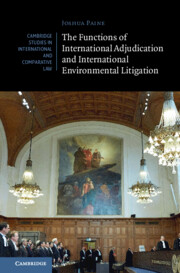Book contents
- The Functions of International Adjudication and International Environmental Litigation
- Cambridge Studies in International and Comparative Law: 189
- The Functions of International Adjudication and International Environmental Litigation
- Copyright page
- Dedication
- Reviews
- Contents
- Acknowledgements
- Table of Cases
- Abbreviations
- 1 Introduction
- 2 Adjudication in the World Trade Organization
- 3 Adjudication under the United Nations Convention on the Law of the Sea
- 4 International Court of Justice Litigation
- 5 Investment Treaty Arbitration
- 6 Conclusion
- Bibliography
- Index
- Cambridge Studies in International and Comparative Law
3 - Adjudication under the United Nations Convention on the Law of the Sea
Published online by Cambridge University Press: 23 May 2024
- The Functions of International Adjudication and International Environmental Litigation
- Cambridge Studies in International and Comparative Law: 189
- The Functions of International Adjudication and International Environmental Litigation
- Copyright page
- Dedication
- Reviews
- Contents
- Acknowledgements
- Table of Cases
- Abbreviations
- 1 Introduction
- 2 Adjudication in the World Trade Organization
- 3 Adjudication under the United Nations Convention on the Law of the Sea
- 4 International Court of Justice Litigation
- 5 Investment Treaty Arbitration
- 6 Conclusion
- Bibliography
- Index
- Cambridge Studies in International and Comparative Law
Summary
Chapter 3 analyses the three selected challenges facing international tribunals – managing change, reviewing State conduct for compliance with international law, and dispute resolution – in the environmental case law of the International Tribunal for the Law of the Sea (ITLOS) and arbitral tribunals constituted under the UN Convention on the Law of the Sea (UNCLOS). UNCLOS tribunals have often interpreted the Convention in a manner that takes account of relevant developments in international law. This is partly due to features of UNCLOS itself, including that it contains many generic or open-ended terms. The chapter demonstrates that the standard and method of review are significant issues in the environmental case law of UNCLOS tribunals, in the context of the Convention conferring on coastal States discretionary powers. These issues raise similar functional questions to those seen in the other adjudication contexts studied, for example regarding the rationales for some deference to domestic authorities. Finally, the chapter demonstrates that UNCLOS tribunals often adjudicate in a facilitative, forward-looking manner, aiming to assist the parties to rebuild their relationship.
Keywords
- Type
- Chapter
- Information
- The Functions of International Adjudication and International Environmental Litigation , pp. 96 - 153Publisher: Cambridge University PressPrint publication year: 2024

